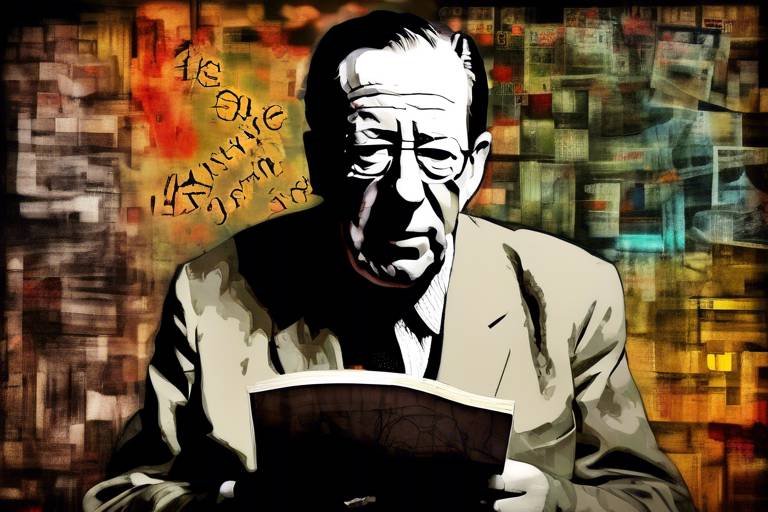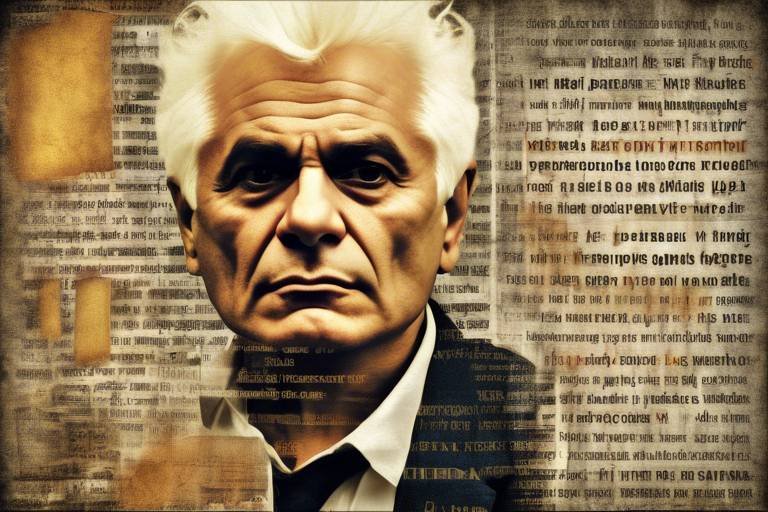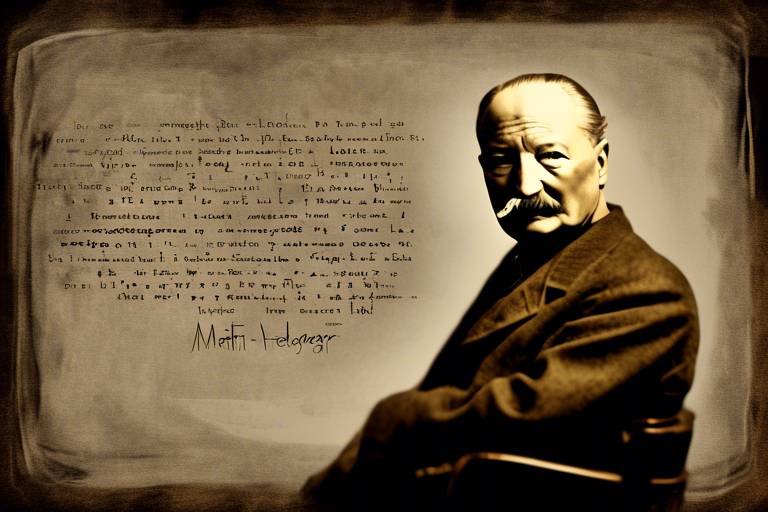What did Philosopher Bruno Latour Contribute to Science Studies?
Bruno Latour, a prominent figure in the realm of philosophy and sociology, has made groundbreaking contributions to the field of science studies. His work has not only reshaped our understanding of scientific practices but has also challenged conventional wisdom about the nature of knowledge itself. Latour's theories encourage us to look beyond the surface of scientific facts and delve into the intricate web of relationships that produce them. So, what exactly did he bring to the table? Let’s explore his influential ideas and how they have transformed our perception of science.
Latour’s approach is characterized by a unique blend of philosophical inquiry and empirical research, which allows for a deeper examination of how science operates in society. By emphasizing the interconnectedness of various actors—both human and non-human—he invites us to reconsider the traditional narratives surrounding scientific discovery and progress. His work is a call to recognize that science is not just a collection of facts waiting to be uncovered, but rather a dynamic process shaped by social, political, and technological factors.
One of Latour’s most significant contributions is his development of the Actor-Network Theory (ANT), which posits that both humans and non-humans play vital roles in the creation of scientific knowledge. This perspective encourages us to view scientific facts as the result of complex interactions within a network rather than as isolated truths. By doing so, Latour challenges the idea of an objective science, suggesting instead that knowledge is always situated within specific contexts and influenced by various actors. This revolutionary viewpoint has sparked a wealth of research and debate, further enriching the field of science studies.
In summary, Bruno Latour’s contributions to science studies have been transformative, prompting scholars and practitioners alike to rethink the nature of scientific knowledge and its production. His emphasis on the relationships between various actors and the social processes involved in scientific practice has opened new avenues for research and understanding, making his work essential for anyone interested in the intersections of science, technology, and society.
- What is Actor-Network Theory?
Actor-Network Theory (ANT) is a framework developed by Bruno Latour that emphasizes the roles of both human and non-human actors in the production of knowledge and technology, suggesting that facts are constructed through complex networks of relationships.
- How does Latour view scientific facts?
Latour argues that scientific facts are not simply discovered but are constructed through social processes, challenging traditional notions of objectivity in science.
- What is the significance of controversies in science?
Controversies serve as critical moments where knowledge is negotiated, revealing the complexities involved in establishing scientific facts and consensus.
- What impact has Latour had on Science and Technology Studies (STS)?
Latour has profoundly influenced STS by prompting scholars to reconsider the relationships between science, technology, and society, leading to a more nuanced understanding of scientific practices.

The Actor-Network Theory
Bruno Latour's Actor-Network Theory (ANT) is a groundbreaking framework that fundamentally reshapes our understanding of scientific knowledge. At its core, ANT emphasizes the intricate web of relationships between both human and non-human actors involved in the production of science and technology. This approach challenges the traditional view that separates science from its social context, arguing instead that scientific facts emerge from a network of interactions.
Imagine a bustling marketplace where various vendors interact, negotiate, and influence one another. In this analogy, each vendor represents an actor in the scientific community—researchers, institutions, instruments, and even the public. Just as the marketplace thrives on these interactions, scientific knowledge is produced through the dynamic relationships among diverse entities. Latour posits that to fully understand scientific practices, we must examine how these actors collaborate, compete, and sometimes conflict in the pursuit of knowledge.
In ANT, the concept of translation is pivotal. Translation refers to the process by which actors redefine their roles and interests to align with others in the network. For instance, when scientists publish their findings, they are not merely sharing data; they are engaging in a complex negotiation that involves convincing their peers, funding bodies, and the public of the validity and importance of their work. This highlights that scientific knowledge is not merely discovered; it is actively constructed through a series of negotiations and alliances.
Furthermore, ANT challenges the notion of a linear progression in scientific discovery. Instead of viewing science as a straightforward path from hypothesis to conclusion, Latour's theory suggests that scientific knowledge is shaped by a multitude of factors, including cultural, political, and economic influences. This perspective invites us to consider how external pressures can affect scientific practices and outcomes.
To illustrate the practical implications of ANT, consider the following table that outlines key components of Actor-Network Theory:
| Component | Description |
|---|---|
| Actors | Entities involved in the network, including humans (scientists, policymakers) and non-humans (instruments, technologies). |
| Networks | The connections and relationships formed between actors that facilitate the production of scientific knowledge. |
| Translation | The process by which actors negotiate and redefine their roles and interests within the network. |
| Controversies | Disputes that arise within the network, highlighting the complexities and dynamics of knowledge production. |
Ultimately, Latour's Actor-Network Theory invites us to rethink the very foundations of scientific inquiry. By recognizing the interplay between human and non-human actors, we gain a richer understanding of how knowledge is produced and validated in society. This perspective not only broadens our comprehension of science but also encourages a more inclusive approach to studying its practices, thereby fostering a deeper appreciation for the complexities of scientific knowledge.

Science as a Social Construct
Bruno Latour's perspective on science challenges the traditional notion that scientific facts are simply waiting to be discovered, like hidden treasures waiting to be unearthed. Instead, he argues that these facts are actually constructed through various social processes. This idea flips the script on how we perceive knowledge production, suggesting that science isn't just a sterile laboratory process but a complex interplay of human interactions, cultural values, and societal norms. Imagine a bustling marketplace where ideas are exchanged, debated, and refined—this is more akin to how scientific knowledge evolves.
Latour's view implies that the context in which science operates significantly shapes its outcomes. For instance, consider how different cultures may approach scientific inquiry differently. In one society, a particular method might be revered, while in another, it could be dismissed. This variability leads us to question the objectivity of scientific knowledge. Are we truly observing the world as it is, or are we seeing it through a lens tinted by our experiences, beliefs, and societal influences?
Furthermore, Latour emphasizes the role of various actors—both human and non-human—in this construction process. Scientists, institutions, funding bodies, and even technologies play a vital part in shaping what we come to accept as scientific truth. For example, when a new drug is developed, its journey from laboratory to market is fraught with negotiations among researchers, pharmaceutical companies, regulatory bodies, and the public. Each of these players has their own interests and perspectives, which collectively influence the final outcome. This brings us to a crucial point: scientific knowledge is not merely a reflection of reality but a product of a social fabric woven from diverse threads.
Latour’s insights encourage us to think critically about the implications of viewing science as a social construct. It prompts scientists to reflect on their practices and recognize the broader societal impacts of their work. In a world where misinformation can spread like wildfire, understanding the social dimensions of science becomes increasingly important. By acknowledging the constructed nature of scientific knowledge, we can foster a more nuanced appreciation of the interplay between science and society.
In summary, Latour's argument that science is a social construct invites us to reconsider the foundations of scientific inquiry. It challenges us to ask: How do our social contexts influence what we accept as knowledge? What role do power dynamics play in shaping scientific discourse? By grappling with these questions, we can better understand the complexities of knowledge production and the responsibilities that come with it.
- What does it mean to say that science is a social construct?
This means that scientific knowledge is shaped by social processes, cultural values, and human interactions rather than being purely objective truths waiting to be discovered.
- How does Latour's view challenge traditional science?
Latour challenges the idea that science is an objective pursuit by highlighting the influence of societal factors, suggesting that knowledge is negotiated rather than simply found.
- Why is it important to understand science as a social construct?
Understanding this concept allows for a more critical examination of scientific practices and encourages scientists to consider the societal implications of their work.

The Role of Controversies
Controversies in science are not just mere disputes; they are the very heartbeat of scientific progress. Bruno Latour emphasizes that these moments of conflict serve as critical junctures where knowledge is negotiated, debated, and ultimately shaped. When scientists clash over differing interpretations, methodologies, or findings, it reveals the intricate tapestry of relationships and influences that govern scientific practice. Think of it like a heated debate in a courtroom, where each side presents their evidence and arguments, and the truth is not simply discovered but actively constructed through dialogue and contention.
Latour’s perspective on controversies highlights that they are essential for understanding how scientific facts come to be accepted. For instance, when examining the infamous Sokal Affair, we see how a seemingly straightforward scientific claim can unravel into a complex web of social, political, and cultural implications. This incident serves as a prime example of how debates can expose the underlying assumptions and biases that often go unnoticed in the pursuit of knowledge. It’s like peeling back the layers of an onion; each layer reveals more about the motivations and contexts that shape scientific discourse.
Moreover, controversies allow scientists to engage with the public and other stakeholders, fostering a dialogue that can lead to a richer understanding of science's role in society. When the public becomes involved in scientific debates—such as those surrounding climate change or vaccination—these discussions can illuminate the values, fears, and hopes that people hold regarding scientific advancements. This interplay between science and society is crucial, as it encourages scientists to consider the broader implications of their work and the societal factors that influence their research agendas.
In summary, controversies are not just obstacles to be overcome; they are vital to the scientific process. They challenge established norms, encourage critical reflection, and ultimately contribute to a more nuanced understanding of how scientific knowledge is produced and validated. By embracing the complexity of these disputes, scientists can gain insights that enhance their work and foster a deeper engagement with the world around them.
- What is the significance of controversies in science?
Controversies are essential for negotiating knowledge, revealing biases, and fostering public engagement in scientific discourse. - How does Latour view the role of society in science?
Latour argues that scientific facts are socially constructed, influenced by societal factors and interactions among various actors. - Can controversies lead to scientific advancement?
Yes, they can challenge existing paradigms and stimulate new ideas, ultimately contributing to scientific progress.

Case Studies in Controversy
Bruno Latour’s exploration of scientific controversies offers a fascinating lens through which we can understand how knowledge is constructed. One of the most notable case studies he examined is the Sokal Affair, where physicist Alan Sokal submitted a deliberately nonsensical article to a cultural studies journal. The article was accepted for publication, leading to a firestorm of debate about the validity of postmodernism in academia. Latour used this controversy to illustrate how scientific credibility can be influenced by social and cultural contexts rather than purely empirical evidence.
Another compelling example is the controversy surrounding the debate on climate change. Latour argues that the discussions and disagreements among scientists, policymakers, and the public reveal the intricate web of relationships that shape scientific consensus. He highlights how various stakeholders, from environmental activists to corporate interests, play a role in negotiating what is considered scientific truth. This case study emphasizes that scientific knowledge is not simply a collection of facts waiting to be discovered; instead, it is a dynamic process influenced by societal values and power structures.
Latour's analysis extends to the realm of genetic engineering. The debates over genetically modified organisms (GMOs) showcase how public perception, regulatory frameworks, and scientific research intertwine. By examining protests, policy discussions, and scientific findings, Latour reveals how controversies can serve as critical moments for society to engage with science. These instances force scientists to reconsider their roles and responsibilities, as the implications of their work resonate beyond the laboratory.
In each of these case studies, Latour demonstrates that controversies are not merely obstacles to scientific progress; they are essential to the evolution of scientific knowledge itself. By engaging with these disputes, scientists and the public can better appreciate the complexities of knowledge production and the myriad factors that influence it.
- What is the Sokal Affair? The Sokal Affair was a hoax in which a physicist submitted a nonsensical paper to a cultural studies journal to test the journal's intellectual rigor.
- How does Latour view scientific controversies? Latour sees scientific controversies as crucial moments that reveal the social dynamics involved in the establishment of scientific facts.
- What role do non-human actors play in science according to Latour? Latour argues that non-human entities, such as technologies and instruments, actively participate in shaping scientific knowledge.

Implications for Scientific Practice
Bruno Latour's insights into the nature of scientific practice have profound implications for how scientists view their work and the production of knowledge. By emphasizing the role of social dynamics and controversies in the establishment of scientific facts, Latour encourages scientists to adopt a more reflective and critical approach to their research. This shift in perspective is crucial, as it highlights the interconnectedness of science with society, culture, and politics.
One of the most significant implications is the understanding that scientific knowledge is not an isolated truth waiting to be uncovered. Instead, it is a product of complex interactions among various actors, including researchers, funding bodies, institutions, and even the public. This realization can lead scientists to appreciate the importance of collaboration and communication in their work, recognizing that their findings are often shaped by the contexts in which they operate.
Moreover, Latour's focus on the role of controversies in science serves as a reminder that disagreement and debate are not merely obstacles to progress but are essential components of the scientific process. When scientists engage with controversies, they are forced to critically evaluate their assumptions, methodologies, and the implications of their findings. This can foster a culture of innovation and openness, where diverse perspectives are valued and explored.
Another implication of Latour's work is the need for scientists to be aware of the ethical dimensions of their research. As they navigate the complexities of scientific practice, they must consider how their work impacts society and the environment. This awareness can lead to more responsible and conscientious research practices, ensuring that science serves the public good.
In practical terms, embracing these implications means that scientific institutions may need to reevaluate their structures and processes. For example, fostering interdisciplinary collaborations can help bridge gaps between different fields, leading to more comprehensive and holistic approaches to research. Additionally, creating platforms for public engagement can enhance the relationship between scientists and the communities they serve, allowing for a richer dialogue about the role of science in society.
In summary, the implications of Latour's contributions to scientific practice are far-reaching. By recognizing the social construction of knowledge, embracing the value of controversies, and prioritizing ethical considerations, scientists can enhance the credibility and relevance of their work. Ultimately, this shift can lead to a more informed and engaged society, where science is not just about facts but also about the narratives and relationships that shape our understanding of the world.
- What is Bruno Latour's Actor-Network Theory? - Actor-Network Theory (ANT) is a framework that emphasizes the relationships between human and non-human actors in the production of scientific knowledge, suggesting that both play active roles in shaping facts.
- How does Latour view scientific controversies? - Latour sees controversies as essential moments in science where knowledge is negotiated, revealing the social and political dimensions of scientific practice.
- What are the implications of Latour's work for scientific ethics? - Latour's work encourages scientists to consider the ethical implications of their research, fostering responsible practices that prioritize public good and societal impact.

Bruno Latour’s Impact on STS
This article explores the significant contributions of philosopher Bruno Latour to the field of science studies, examining his theories and their impact on understanding scientific practices and knowledge production.
Latour's Actor-Network Theory (ANT) reshapes how we understand scientific knowledge by emphasizing the relationships between human and non-human actors in the production of science and technology.
Latour argues that scientific facts are not merely discovered but constructed through social processes, challenging traditional views of objectivity in science and highlighting the influence of societal factors.
Controversies in science serve as pivotal moments where knowledge is negotiated, revealing the complexities and dynamics involved in the establishment of scientific facts and consensus.
Latour's examination of specific scientific controversies, such as the Sokal Affair, illustrates how these disputes can illuminate the underlying social and political dimensions of scientific practice.
Understanding controversies encourages scientists to reflect critically on their work, fostering a more nuanced appreciation of the interplay between science and society.
Bruno Latour's influence on Science and Technology Studies (STS) is nothing short of revolutionary. His theories have compelled scholars to rethink the traditional boundaries that separate science, technology, and society. By advocating for a more integrated approach, Latour has opened up new avenues of inquiry that challenge the conventional wisdom surrounding scientific practices.
One of the most significant impacts of Latour's work is the shift in focus from the outcomes of scientific research to the processes and networks that produce knowledge. This perspective encourages researchers to consider a wide array of factors, including social, political, and economic influences, that shape scientific inquiry. For instance, Latour's exploration of the role of non-human actors—like instruments and technologies—has led to a deeper understanding of how these entities contribute to the construction of scientific facts.
Moreover, Latour's emphasis on the dynamics of power and negotiation within scientific communities has prompted scholars to investigate how various stakeholders, including policymakers, industry representatives, and the public, influence scientific discourse. This multifaceted approach has enriched STS by providing a more comprehensive view of how knowledge is produced and validated.
Latour's work also highlights the importance of **ethnographic methods** in STS research. By immersing themselves in scientific settings, researchers can capture the intricate social interactions and practices that underpin scientific work. This ethnographic lens not only reveals the complexities of scientific collaboration but also emphasizes the **contextual nature of knowledge** production.
In summary, Bruno Latour's contributions to STS have profoundly reshaped the field, encouraging scholars to explore the intricate relationships between science, technology, and society. His ideas challenge us to consider the broader implications of scientific practices and inspire ongoing research that seeks to understand the evolving landscape of knowledge production.
Latour emphasizes the importance of non-human entities, such as instruments and technologies, in shaping scientific knowledge, arguing that they play an active role in the production of facts.
The concept of technological mediation highlights how tools and artifacts influence scientific practices and outcomes, challenging the notion that science is solely a human endeavor.
Latour advocates for ethnographic methods to study scientific practices, allowing researchers to gain insights into the everyday activities and interactions that constitute scientific work.
While Latour's ideas have garnered significant attention, they have also faced critiques, particularly regarding their implications for the objectivity and reliability of scientific knowledge.
Latour and his supporters have addressed these critiques by emphasizing the value of understanding science as a complex, socially situated practice rather than a simple quest for truth.
Latour's contributions continue to inspire new research directions in science studies, encouraging scholars to explore the evolving relationships between science, technology, and society in contemporary contexts.
- What is Actor-Network Theory?
Actor-Network Theory (ANT) is a framework developed by Bruno Latour that emphasizes the interconnectedness of human and non-human actors in the production of scientific knowledge. - How has Latour influenced Science and Technology Studies?
Latour has encouraged scholars to rethink the boundaries between science, technology, and society, leading to a more integrated understanding of knowledge production. - Why are controversies important in science?
Controversies reveal the complexities involved in establishing scientific facts and highlight the negotiations between different stakeholders in the scientific community.

The Role of Non-Humans in Science
Bruno Latour’s perspective on the role of non-humans in science is nothing short of revolutionary. He argues that scientific knowledge is not solely the product of human intellect but is significantly shaped by a myriad of non-human entities. From laboratory instruments to the technologies we use daily, these non-human actors play a crucial role in the scientific process. Imagine a scientist working in a lab: their findings are not just a result of their expertise but also depend on the sophisticated tools and machines they utilize. This interplay between humans and non-humans emphasizes that science is a collaborative endeavor, involving a network of interactions that extend beyond human agency.
Latour introduces the concept of technological mediation, which highlights how instruments and technologies are not mere passive tools but active participants in the creation of scientific knowledge. For example, a microscope does not just magnify; it transforms our understanding of the microscopic world. It shapes the questions scientists ask and the conclusions they draw. Thus, the relationship between human researchers and non-human entities is dynamic and reciprocal, where each influences the other in profound ways.
To illustrate this point, consider the following aspects of non-human involvement in scientific practices:
- Instruments: Tools like spectrometers and centrifuges are essential for conducting experiments and gathering data. They can determine the success or failure of an experiment, thereby influencing scientific outcomes.
- Technologies: Software and computational models have revolutionized fields such as biology and physics, allowing scientists to simulate complex phenomena and analyze vast datasets.
- Artifacts: Physical objects, whether they are fossils in paleontology or samples in geology, serve as critical evidence that shapes scientific narratives and theories.
Latour's emphasis on non-humans challenges traditional views of science as a purely human endeavor. It invites us to reconsider the boundaries of scientific inquiry and recognize that knowledge production is a complex interplay of various actors. This perspective also raises important questions about the reliability and objectivity of scientific knowledge. If non-humans can influence outcomes, how do we account for their role in the scientific narrative?
Moreover, Latour’s approach encourages a more inclusive understanding of science, one that acknowledges the contributions of non-human actors and their agency within scientific practices. By recognizing the importance of these entities, scientists can develop a more comprehensive view of their work, leading to a deeper appreciation of the intricate web of relationships that underpin scientific discovery.
In conclusion, the role of non-humans in science, as articulated by Bruno Latour, is a vital aspect of understanding how knowledge is constructed. It challenges us to rethink the nature of scientific inquiry and encourages a broader perspective that includes the diverse array of actors involved in the process. This shift not only enriches our understanding of science but also highlights the interconnectedness of technology, society, and knowledge production.
- What is the Actor-Network Theory? - Actor-Network Theory (ANT) is a framework developed by Bruno Latour that emphasizes the relationships between human and non-human actors in the production of knowledge and technology.
- How do non-human entities influence scientific knowledge? - Non-human entities, such as instruments and technologies, actively shape scientific practices, outcomes, and the questions scientists pursue.
- Why is Latour's view considered controversial? - Latour's perspective challenges traditional notions of objectivity in science, suggesting that social and technological factors significantly influence scientific knowledge.

Technological Mediation
Bruno Latour’s concept of is a fascinating lens through which to view the interplay between science and technology. It challenges the traditional notion that scientific inquiry is purely a human endeavor, suggesting instead that technologies and instruments are not mere tools but active participants in the creation of knowledge. Think about it: when scientists conduct experiments, they rely on various instruments, from microscopes to complex software. These tools don’t just assist; they shape the results and interpretations of scientific work.
Latour illustrates that the relationship between humans and non-humans is a dynamic one. For instance, consider the role of a laboratory instrument. It doesn’t simply provide data; it influences how scientists perceive and understand that data. This mediation can alter the trajectory of research, guiding scientists toward certain conclusions while obscuring others. In this sense, technologies can be seen as actors within the scientific network, actively engaging in the production of knowledge.
This perspective leads to some intriguing questions: How do specific technologies shape scientific practices? What happens when a new tool is introduced into a research environment? To explore these questions, Latour advocates for an ethnographic approach, encouraging researchers to observe and analyze the interactions between scientists and their tools. By doing so, we gain insights into the everyday realities of scientific work, revealing how technological mediation plays a crucial role in shaping scientific outcomes.
To further illustrate this point, consider the following table that summarizes the key elements of technological mediation:
| Element | Description |
|---|---|
| Instruments | Tools that facilitate scientific inquiry and influence data interpretation. |
| Artifacts | Physical objects that embody scientific knowledge and practices. |
| Human Interaction | The ways in which scientists engage with technologies during research. |
| Knowledge Production | The collaborative process between humans and non-humans in creating scientific facts. |
In summary, technological mediation is a vital aspect of understanding the complexities of scientific practices. By recognizing the active role that technologies play, we can appreciate the nuanced relationships that exist within scientific networks. This perspective not only enriches our understanding of science but also prompts us to reconsider the boundaries between human and non-human actors in the realm of knowledge production.
- What is technological mediation? Technological mediation refers to the active role of technologies and instruments in shaping scientific knowledge and practices.
- Why is it important to study technological mediation? Understanding technological mediation allows us to see how tools influence scientific outcomes and the relationships between human and non-human actors.
- How does Latour's view differ from traditional perspectives on science? Latour challenges the idea that science is solely a human pursuit, emphasizing the importance of non-human entities in the production of knowledge.

Ethnographic Approaches
Bruno Latour’s advocacy for in the study of scientific practices represents a significant shift in how we understand the production of knowledge. Unlike traditional methodologies that often prioritize theoretical frameworks or quantitative data, ethnography immerses researchers in the daily lives of scientists and their environments. This hands-on approach allows for a deeper understanding of the intricate and often messy realities of scientific work. Imagine stepping into a lab, surrounded by beeping machines and the hum of conversation, where the real action unfolds—not just in the results published in journals, but in the interactions, negotiations, and even conflicts that happen behind the scenes.
Ethnography enables researchers to observe scientists as they grapple with problems, deliberate over data, and engage with both human and non-human actors. This method reveals the social dynamics that influence scientific inquiry, often highlighting the ways in which knowledge is constructed rather than merely discovered. For instance, by shadowing a team of researchers working on climate change models, an ethnographer might uncover how their discussions are shaped by external pressures—such as funding sources, public opinion, and political agendas—thereby illustrating the complex interplay between science and society.
Moreover, Latour emphasizes that this approach is not just about observing but also about participating. Ethnographers often find themselves becoming part of the scientific community they study, which can lead to a richer understanding of the practices and values that drive scientific work. This immersion allows for the collection of qualitative data that can provide insights into the motivations and challenges faced by scientists, thus painting a fuller picture of the scientific enterprise. For example, in a study of a biotechnology lab, an ethnographer might note how the physical layout of the space influences collaboration and communication among team members, which in turn affects research outcomes.
In addition to providing insights into scientific practices, ethnographic approaches also challenge the notion of objectivity in science. By documenting the social interactions and contexts in which scientific knowledge is produced, ethnographers reveal that science is a deeply human endeavor, influenced by cultural, social, and political factors. This perspective invites us to reconsider what we deem as scientific fact and encourages a more nuanced view of knowledge production. Ethnography doesn’t just capture the “what” of scientific work; it delves into the “how” and “why,” offering a comprehensive understanding of the complexities involved.
In conclusion, Latour’s emphasis on ethnographic methods enriches the field of science studies by providing a lens through which we can examine the interconnectedness of science, technology, and society. This approach not only enhances our comprehension of how scientific knowledge is created but also underscores the importance of context in shaping scientific practices. As we continue to explore the evolving landscape of science, ethnography remains a vital tool for uncovering the stories behind the data, reminding us that science is as much about people and their interactions as it is about facts and figures.
- What is ethnography in science studies? Ethnography in science studies involves immersive observation and participation in scientific practices to understand the social dynamics and contexts that shape knowledge production.
- How does Latour's approach differ from traditional scientific research methods? Latour's approach emphasizes the social construction of knowledge and the role of non-human actors, contrasting with traditional methods that often focus solely on quantitative data and theoretical frameworks.
- Why is understanding the social context of science important? Understanding the social context of science is crucial because it reveals how societal factors influence scientific inquiry and knowledge production, challenging the notion of objectivity in science.

Critiques and Controversies
While Bruno Latour's contributions to science studies have sparked significant interest and admiration, they have also ignited a firestorm of criticism. Critics argue that his ideas challenge the very foundation of scientific objectivity, raising questions about the reliability of scientific knowledge. One of the primary critiques revolves around the notion that if scientific facts are socially constructed, then does that mean they are inherently subjective? This perspective can lead to a slippery slope where all knowledge becomes relative, undermining the credibility of scientific endeavors.
Moreover, some scholars contend that Latour's emphasis on the intricate relationships between human and non-human actors may dilute the responsibility of scientists in the knowledge production process. If technologies and instruments are seen as active participants in shaping knowledge, where does that leave the accountability of researchers? This question is particularly pertinent in an age where scientific integrity is paramount, especially in fields like medicine and environmental science.
Critics also point out that Latour's approach may overlook the rigorous methodologies that underpin scientific research. While acknowledging the role of social contexts, they argue that it is essential to recognize the systematic processes that scientists employ to ensure objectivity and reliability. This debate often leads to a broader discussion about the nature of truth in science, which can be quite polarizing.
Despite these critiques, Latour and his supporters have been quick to respond. They argue that understanding science as a complex, socially situated practice does not negate the value of scientific inquiry; rather, it enriches our understanding of how knowledge is produced and validated. This perspective encourages a more nuanced view of science, one that acknowledges the interplay between societal influences and scientific rigor. In fact, Latour's work has prompted many to reconsider the boundaries of scientific practice and the role of ethics in research.
In light of these debates, it becomes clear that Latour's influence extends beyond mere theory; it has real implications for how we approach scientific research in the modern world. By challenging traditional views, he opens up a dialogue about the responsibilities of scientists and the societal contexts in which they operate. As we navigate these complexities, it is essential to keep the conversation going, ensuring that we remain critical yet appreciative of the multifaceted nature of scientific knowledge.
- What is Bruno Latour's Actor-Network Theory?
Actor-Network Theory (ANT) posits that both human and non-human entities play crucial roles in the construction of scientific knowledge, emphasizing the relationships and networks that bind them together. - How does Latour's work challenge traditional views of science?
Latour argues that scientific facts are not merely discovered but are constructed through social processes, which raises questions about objectivity and the nature of truth in science. - What are some criticisms of Latour's ideas?
Critics argue that Latour's approach may undermine the reliability of scientific knowledge and dilute the responsibility of scientists by attributing too much influence to non-human actors. - How have Latour's contributions influenced modern science studies?
Latour's work has prompted scholars to rethink the boundaries between science, technology, and society, encouraging a more integrated approach to understanding scientific practices.

Responses to Critiques
Bruno Latour's theories have stirred up quite a debate in the academic community, particularly regarding the implications of his views on the objectivity and reliability of scientific knowledge. Critics argue that by emphasizing the social construction of science, Latour risks undermining the credibility of scientific facts. However, Latour and his supporters have been quick to respond to these critiques, advocating for a more nuanced understanding of science as a complex, socially situated practice.
One of the central tenets of Latour's argument is that science is not just about discovering objective truths; rather, it's about navigating a web of relationships among various actors, including scientists, institutions, technologies, and society at large. This perspective does not necessarily negate the validity of scientific findings; instead, it highlights the intricate processes that lead to those findings. Latour posits that recognizing these processes can enhance our understanding of science and its role in society.
To address concerns about objectivity, Latour emphasizes that acknowledging the social influences on science does not equate to dismissing scientific rigor. In fact, he argues that understanding the social context can lead to more robust scientific practices. By examining how societal factors shape scientific inquiry, researchers can better identify biases and strive for greater transparency in their work.
Moreover, Latour's approach encourages scientists to engage with their work critically. Instead of viewing their findings as absolute truths, scientists are urged to consider the broader implications of their research and the ways in which it interacts with societal values and norms. This reflective practice can foster a more responsible and ethical approach to scientific inquiry, ultimately benefiting both the scientific community and society as a whole.
In response to the critique that his theories may lead to relativism, Latour maintains that recognizing the social dimensions of science does not imply that all knowledge is equally valid. Instead, it calls for a more sophisticated understanding of how knowledge is constructed and validated within specific contexts. By engaging with the complexities of scientific practice, scholars can better appreciate the strengths and limitations of various forms of knowledge.
In summary, while Latour's ideas have sparked significant debate, his responses to critiques emphasize the importance of viewing science as a dynamic interplay of social, political, and technological factors. This perspective not only enriches our understanding of scientific practices but also encourages a more critical and engaged approach to the production of knowledge.
- What is Actor-Network Theory?
Actor-Network Theory (ANT) is a framework developed by Bruno Latour that emphasizes the relationships between human and non-human actors in the production of knowledge and technology. - How does Latour view scientific facts?
Latour argues that scientific facts are socially constructed rather than merely discovered, highlighting the influence of societal factors on the establishment of knowledge. - What role do controversies play in science?
Controversies serve as critical moments where knowledge is negotiated, revealing the complexities involved in establishing scientific consensus. - Why is Latour's work significant in Science and Technology Studies?
Latour's work has profoundly influenced STS by prompting scholars to rethink the boundaries between science, technology, and society.

Future Directions in Science Studies
This article explores the significant contributions of philosopher Bruno Latour to the field of science studies, examining his theories and their impact on understanding scientific practices and knowledge production.
Latour's Actor-Network Theory (ANT) reshapes how we understand scientific knowledge by emphasizing the relationships between human and non-human actors in the production of science and technology.
Latour argues that scientific facts are not merely discovered but constructed through social processes, challenging traditional views of objectivity in science and highlighting the influence of societal factors.
Controversies in science serve as pivotal moments where knowledge is negotiated, revealing the complexities and dynamics involved in the establishment of scientific facts and consensus.
Latour's examination of specific scientific controversies, such as the Sokal Affair, illustrates how these disputes can illuminate the underlying social and political dimensions of scientific practice.
Understanding controversies encourages scientists to reflect critically on their work, fostering a more nuanced appreciation of the interplay between science and society.
Latour's work has profoundly influenced Science and Technology Studies (STS), prompting scholars to rethink the boundaries between science, technology, and society in their research and analysis.
Latour emphasizes the importance of non-human entities, such as instruments and technologies, in shaping scientific knowledge, arguing that they play an active role in the production of facts.
The concept of technological mediation highlights how tools and artifacts influence scientific practices and outcomes, challenging the notion that science is solely a human endeavor.
Latour advocates for ethnographic methods to study scientific practices, allowing researchers to gain insights into the everyday activities and interactions that constitute scientific work.
While Latour's ideas have garnered significant attention, they have also faced critiques, particularly regarding their implications for the objectivity and reliability of scientific knowledge.
Latour and his supporters have addressed these critiques by emphasizing the value of understanding science as a complex, socially situated practice rather than a simple quest for truth.
As we look ahead, the future of Science Studies is poised for exciting transformations, largely influenced by Latour's groundbreaking work. Scholars are increasingly recognizing the need to explore the interconnectedness of science, technology, and society in a rapidly changing world. This involves embracing new methodologies that reflect the complexity of these relationships.
One significant direction is the integration of digital technologies into scientific practices. With the rise of big data and artificial intelligence, researchers are investigating how these tools not only enhance scientific inquiry but also reshape the very fabric of research itself. The implications of this are profound: as technology evolves, so too does the nature of scientific knowledge and its dissemination.
Moreover, there is a growing emphasis on interdisciplinary collaboration. By breaking down traditional barriers between fields, scientists and social scientists can work together to address pressing global challenges, such as climate change and public health crises. This collaborative approach fosters a richer understanding of how scientific knowledge is produced and utilized in society.
Additionally, the role of public engagement in science is becoming more pronounced. As communities demand transparency and accountability from scientific institutions, researchers are exploring how to better communicate their work to the public. This shift not only democratizes science but also ensures that diverse perspectives are considered in the scientific process.
In summary, the future of Science Studies is characterized by a commitment to understanding the dynamic interplay between science, technology, and society. As new challenges arise, Latour's insights will continue to inspire scholars to investigate these relationships, ultimately leading to a more nuanced understanding of how knowledge is constructed and utilized in our world.
- What is Actor-Network Theory?
Actor-Network Theory (ANT) is a framework developed by Bruno Latour that emphasizes the relationships between various actors, both human and non-human, in the production of knowledge and technology.
- How does Latour view scientific facts?
Latour argues that scientific facts are socially constructed rather than merely discovered, highlighting the influence of societal factors in their establishment.
- What is the significance of controversies in science?
Controversies serve as critical moments for negotiating knowledge and understanding the dynamics of scientific consensus.
- Why is public engagement important in science?
Public engagement fosters transparency and accountability, ensuring that diverse perspectives are included in scientific discourse and decision-making.
Frequently Asked Questions
- What is Bruno Latour's Actor-Network Theory?
Bruno Latour's Actor-Network Theory (ANT) is a framework that redefines how we perceive scientific knowledge. It emphasizes the intricate web of relationships between both human and non-human actors, such as technologies and instruments, that contribute to the production of science and technology. This theory challenges the traditional view of science as a purely human endeavor, highlighting the active role of non-human entities in shaping scientific outcomes.
- How does Latour view scientific facts?
Latour argues that scientific facts are not simply discovered but are constructed through social processes. This perspective challenges the conventional notion of objectivity in science, suggesting that societal influences, cultural contexts, and power dynamics play a significant role in the establishment of what is considered scientific knowledge.
- What role do controversies play in the production of scientific knowledge?
Controversies in science are critical moments where knowledge is negotiated and debated. Latour posits that these disputes reveal the complexities involved in establishing scientific facts and consensus. By examining controversies, we can gain insights into the social and political dimensions that underpin scientific practices.
- Can you give an example of a scientific controversy discussed by Latour?
One notable example is the Sokal Affair, where physicist Alan Sokal submitted a deliberately nonsensical paper to a cultural studies journal. Latour's analysis of this incident illustrates how scientific controversies can expose the underlying social dynamics and challenges the perceived boundaries between science and humanities.
- What implications does Latour's work have for scientific practice?
Latour's insights encourage scientists to critically reflect on their work and acknowledge the interplay between science and society. By understanding the social processes that shape scientific knowledge, researchers can better appreciate the complexities involved in their field and strive for a more nuanced approach to their practices.
- How has Latour influenced Science and Technology Studies (STS)?
Latour's contributions have significantly impacted the field of Science and Technology Studies (STS), prompting scholars to rethink the relationships between science, technology, and society. His work encourages a more interdisciplinary approach, integrating insights from various fields to understand the multifaceted nature of scientific practices.
- What is meant by 'technological mediation' in Latour's theories?
Technological mediation refers to the idea that tools and artifacts play an active role in shaping scientific practices and outcomes. Latour argues that science is not solely a human endeavor; rather, technologies and instruments influence how knowledge is produced and understood, thereby complicating the narrative of scientific objectivity.
- What ethnographic approaches does Latour advocate for studying science?
Latour promotes the use of ethnographic methods to study scientific practices, which allows researchers to observe and analyze the everyday activities and interactions that constitute scientific work. This approach provides a deeper understanding of how science operates in real-world settings, revealing the intricate dynamics at play.
- What critiques have been raised against Latour's ideas?
Latour's theories have faced critiques, particularly concerning their implications for the objectivity and reliability of scientific knowledge. Critics argue that by emphasizing the social construction of facts, Latour undermines the credibility of scientific findings. However, supporters contend that understanding science as a socially situated practice enriches our comprehension of its complexities.
- What future directions does Latour's work suggest for science studies?
Latour's contributions continue to inspire new research directions in science studies, encouraging scholars to explore the evolving relationships between science, technology, and society. His work prompts ongoing discussions about how these dynamics shape contemporary scientific practices and the implications for knowledge production in the modern world.



















